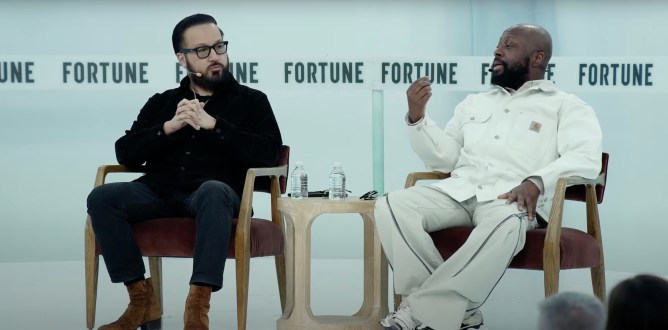Grammy Award-winning musician, composer, and producer Wyclef Jean has declared the music industry broken. This is why he is now involved with a startup called OpenWav that aims to give power back to the artists. Through the OpenWav app, which launched over the summer, artists can release new music and exclusives, connect directly with fans, sell merchandise, and host concerts, pop-ups, and listening parties. The startup also plans to offer artists more assistance using AI tools in the future.
Speaking at the Fortune Brainstorm Tech conference, Jean, who is the chief creative officer at OpenWav, had harsh words for the state of the music industry. He was particularly critical of the business model used by streaming services. Jean stated that for a new artist, the number of streams required to earn ten thousand dollars is a rip-off, leading to a constant revolt among musicians. He pointed to Cardi B as a recent example, explaining that while people may have found it funny she was selling CDs on the street to promote her album, she was actually demonstrating how difficult things have become for artists.
OpenWav co-founder and CEO Jaeson Ma provided perspective by noting that on Spotify, an artist must achieve one million streams to earn just three thousand dollars. Ma is a media industry entrepreneur, investor, and adviser who has backed numerous startups. He explained that the industry’s broken model is the reason his team is building a direct-to-fan music platform.
Ma agreed with a recent social media post from singer Lizzo, who complained about the algorithms not rewarding music and the lack of a definitive song of the summer. Ma then explained that today’s artists do not need a million listeners on Spotify, but rather one thousand true fans. He illustrated that if one thousand true fans each contribute ten dollars a month, an artist could earn one hundred and twenty thousand dollars a year. This direct financial support from fans can create a sustainable career, as those fans will also buy tickets, exclusive music, and merchandise.
While OpenWav is not alone in targeting super fans as a revenue stream for artists, it differs in its focus. Instead of targeting major artists, OpenWav is going after indie artists and those just starting out. The concept of a direct-to-fan platform is not entirely new, but Ma argues that OpenWav combines all the necessary tools in one place.
Artists on OpenWav can sell tickets and keep eighty percent of the profit, with twenty percent going to the platform. Everyone who buys a ticket joins an event chat, similar to Discord, allowing the artist to communicate and network directly with their fans. Artists can also drop merchandise into the same community chat with zero upfront costs and no inventory through global dropshipping. Crucially, artists on the platform own their audience data, including fan email addresses and phone numbers.
The platform also allows artists to use AI to design merchandise. Both Jean and Ma expressed great enthusiasm for AI technology. Jean noted that AI can help musical artists create more than ever before, and Ma mentioned that even producer Timbaland uses AI music services as a tool. In the future, OpenWav plans to use AI to assist artists like a manager would, suggesting tour locations or merchandise ideas and providing tools to create album art or lyric videos. Ma stated that AI will become an artist’s best friend, with these AI features planned for a future phase of the app. The OpenWav app is currently available on iOS and Android devices.

